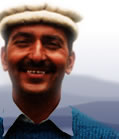 |
 |
||
 |
|||
|
RELATED THEMES environment history social institutions OTHER LOCAL THEMES BACKGROUND |
politics The Mir of Hunza controlled all villages in Hunza and Gojal until the early 1970s. In each village, including Shimshal, the Mir appointed representatives to run village affairs on his behalf. The Mir's main representative was the arbob, who acted as a village head, but there were also individuals in charge of tax collection and announcements. One narrator explains: "The task of the arbob was that when the Mirs of Hunza would issue an order, the arbob would convey the orders to the people and would also implement the orders. Arbob would also schedule routine community works and would inform the community for execution of that work…" (Pakistan 5). The interview with a journalist for a key national newspaper provides some political history of the Northern Areas in general, especially the story of the struggle to remove the Mir (Pakistan 11). In 1974 Zulfiqar Bhutto's government (the Pakistan People's Party - PPP) declared an end to the Mir of Hunza's reign, along with other remaining princely states in Pakistan. By this time the Mir's authority was already vulnerable: many people were becoming educated or had been able to leave the area and so were aware of the more democratic conditions existing elsewhere in Pakistan. Nevertheless several narrators explain, that at the end of the Mir's regime people felt confused and found it difficult to come to terms with a new system: "…the people didn't know the benefits of it, of society, they were used to a system which was exploiting them, which was humiliating them, which had created classes. So they were used to that system, it was not easy for them to just disobey and accept new ideas, new concepts and new society" (Pakistan 11). Despite this freedom from the Mir, today the Northern Areas are officially regarded as disputed territory and so citizens are restricted from voting on Pakistan's National Assembly. Today Shimshal is related to the wider national political structure through the numberdar, who serves as the government representative in the village, and the union council, which is elected by Shimshalis and is in charge of all major decisions. In addition there are many other institutions (some Ismaili) which could be said to have a role in political life in Shimshal. Shimshalis pride themselves on their Arbitration Committee and its ability to find solutions to disputes, mostly over land. This spares villagers the expense and inconvenience of taking their disputes to the official courts of law. Shimshal has always had a strategic geographical location especially during the period of the "Great Game" (the competition between Russia and the UK for influence in northern India, Afghanistan, Iran and Tibet). There have been various border disputes in the past, and in the 1960s the Pakistan army were present along the Shimshal-China border. Today relations have thawed as a result of the Pak-China friendship agreement (1963). The Shimshal Nature Trust (SNT) can be seen as a political response to the threat posed to the community by the plans for the Khunjerab National Park (KNP). Within Shimshal there was widespread distrust of the government and their national park plans after the community had seen what had happened in other areas included in the KNP. After initial demonstrations by the community against the plans, a group of younger Shimshalis decided that it was important to negotiate with the government more officially if they were to successfully resist the plans. Together, they formulated their own environmental management plan, similar in style to the government's own plan for the KNP. This served to articulate their sustainable relationship with the environment and their plans for the future to ensure its continued sustainable use. The SNT was successful in generating the support of various international organisations and individuals and also gained respect from the government for its approach. The SNT continues to work towards implementing its management plan which covers all aspects of life in Shimshal. Generally it receives widespread support from the community and hopes to assist Shimshal through a period of change and transition. The board of governers of SNT is made up of village elders from all of the main skuins (sub-clans) in Shimshal. There has been a conscious decision to make it a representative community institution. quotes about politicsWe had changes after the Hunza kingdom ended. We had [a new] political system come in with a lot of confusion. That really disturbed the society locally because we had no experience with that, and the political ideas and system developed in the urban setting, in an environment of exploitation, really could not fit the small cohesive local society here. "…There was a system which prevailed for 900 years in Hunza, one man rule of Mir's, who was exploiting the people, who had imposed a lot of taxes on the people. So the people revolted against him through a political party; Pakistan Peoples Party was first introduced in the area and through the platform of PPP they struggled to work against the Mir of Hunza." "I became a political activist...affiliated with some left progressive youngsters and worked with them for the rights of Northern Areas. Because you know the Northern Areas has still been neglected and denied of its basic human rights, like its identity has not been given to it. The people of Northern Areas have been denied their democratic rights…" "…we have our own institution of justice and arbitration where the disputes are resolved and mediations are made free of cost. In the government's courts of law people spoil their resources (money) and life as the decisions take several years and there is no brotherhood between the parties." "..in the 1980s… They (the government) decided to implement the [Khunjerab National] Park in the Shimshal area also. But the community…felt a threat and they resisted it. But…people couldn't understand how to resist it. Rationally they couldn't understand what a National Park means and what its implication would be for their lives. So they just opposed it and sent back some of the Park wardens who were visiting Shimshal and Pamir… In 1994 the government of Pakistan hired WWF to formulate a new management plan for the…Park… And there was much pressure on the locals to implement the Park rules in Shimshal. Meaning that we have to vacate all those areas demarcated as a National Park and we have to bring our livestock out of that area. Some areas were agricultural land… for many years, like 2-300 years people have been cultivating there. [But]… it was just decided somewhere that this was a National Park and nobody came to Shimshal to analyse this thing to analyse what will be the consequence on people's lives, what the people will do now…" "What SNT wants is that we should have a local parameter for choosing what suits the local society or what we need… We should give more importance to people's point of views, their participation and to people owning things. People have their own pace and that should be respected. We don't oppose outside ideas, but what we try to say is that it should be the people who prioritise their needs and decide what they need…" |
|